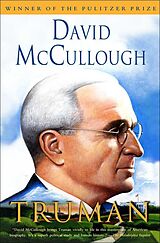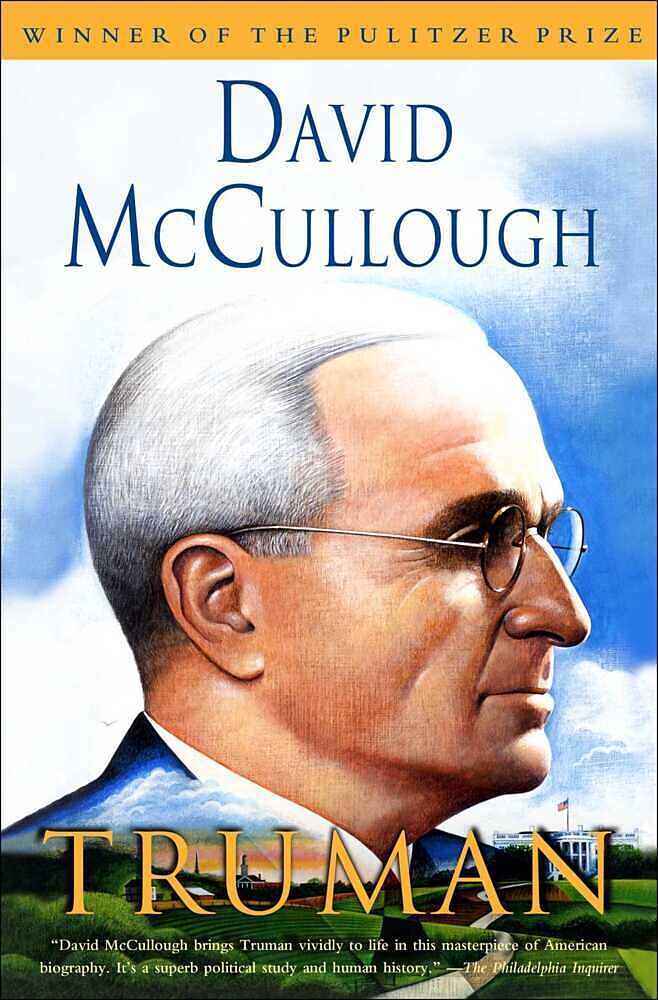Truman
Einband:
Kartonierter Einband
EAN:
9780671869205
Untertitel:
Englisch
Genre:
Geschichte
Autor:
David McCullough
Herausgeber:
Simon & Schuster N.Y.
Auflage:
ed
Anzahl Seiten:
1120
Erscheinungsdatum:
21.06.2004
ISBN:
978-0-671-86920-5
A biography of the U.S. president explores Truman's brutal frontier childhood, his education, his dogged optimism, and his rise through the ranks of the Pendergast machine that controlled Missouri politics
"McCullough is a master storyteller whose considerable narrative skills have been put to exquisite use in re-creating the life and times of America's 33rd president."
-- Robert Dallek, Los Angeles Times Book Review
Autorentext
David McCullough (1933–2022) twice received the Pulitzer Prize, for Truman and John Adams, and twice received the National Book Award, for The Path Between the Seas and Mornings on Horseback. His other acclaimed books include The Johnstown Flood, The Great Bridge, Brave Companions, 1776, The Greater Journey, The American Spirit, The Wright Brothers, and The Pioneers. He was the recipient of numerous honors and awards, including the Presidential Medal of Freedom, the nation’s highest civilian award. Visit DavidMcCullough.com.
Klappentext
A monumental biography of an extraordinary president, Harry Truman--the man who brought the country solidly into the 20th century. Drawing from archival materials and extensive interviews, McCullough chronicles Truman's life, but it is Truman's emergence as a decisive and confident president that forms the heart of this book.
Zusammenfassung
The Pulitzer Prize–winning biography of Harry S. Truman, whose presidency included momentous events from the atomic bombing of Japan to the outbreak of the Cold War and the Korean War, told by America’s beloved and distinguished historian.
The life of Harry S. Truman is one of the greatest of American stories, filled with vivid characters—Roosevelt, Churchill, Stalin, Eleanor Roosevelt, Bess Wallace Truman, George Marshall, Joe McCarthy, and Dean Acheson—and dramatic events. In this riveting biography, acclaimed historian David McCullough not only captures the man—a more complex, informed, and determined man than ever before imagined—but also the turbulent times in which he rose, boldly, to meet unprecedented challenges. The last president to serve as a living link between the nineteenth and the twentieth centuries, Truman’s story spans the raw world of the Missouri frontier, World War I, the powerful Pendergast machine of Kansas City, the legendary Whistle-Stop Campaign of 1948, and the decisions to drop the atomic bomb, confront Stalin at Potsdam, send troops to Korea, and fire General MacArthur. Drawing on newly discovered archival material and extensive interviews with Truman’s own family, friends, and Washington colleagues, McCullough tells the deeply moving story of the seemingly ordinary “man from Missouri” who was perhaps the most courageous president in our history.
Leseprobe
Chapter 1
Blue River Country
As an agricultural region, Missouri is not surpassed by any state in the Union. It is indeed the farmer's kingdom....
The History of Jackson County, Missouri, 1881
I
In the spring of 1841, when John Tyler was President, a Kentucky farmer named Solomon Young and his red-haired wife, Harriet Louisa Young, packed their belongings and with two small children started for the Far West. They had decided to stake their future on new land in the unseen, unfamiliar reaches of westernmost Missouri, which was then the "extreme frontier" of the United States.
They were part of a large migration out of Kentucky that had begun nearly twenty years before, inspired by accounts of a "New Eden" in farthest Missouri -- by reports sent back by Daniel Morgan Boone, the son of Daniel Boone and by the fact that in 1821 Missouri had come into the Union as a slave state. The earliest settlers included families named Boggs, Dailey, and Adair, McCoy, McClelland, Chiles, Pitcher, and Gregg, and by 1827 they had founded a courthouse town called Independence, pleasantly situated on high ground in Jackson County, in what was often spoken of as the Blue River country. Those who came afterward, at the time of Solomon and Harriet Louisa Young, were named Hickman, Holmes, and Ford, Davenport, McPherson, Mann, Noland, and Nolan, Freeman, Truman, Peacock, Shank, Wallace, and Whitset, and they numbered in the hundreds.
Nearly all were farmers, plain-mannered and plain-spoken, people with little formal education. Many of them were unlettered, even illiterate. They were not, however, poor or downtrodden, as sometimes pictured -- only by the material standards of later times could they be considered wanting -- and though none were wealthy, some, like red-haired Harriet Louisa, came from families of substantial means. She had said goodbye to a spacious Greek Revival house with wallpaper and milled woodwork, the Kentucky home of her elder brother and guardian, William Gregg, who owned numerous slaves and landholdings running to many hundreds of acres.
The great majority of these people were of Scotch-Irish descent. They were Baptists and they were Democrats, and like Thomas Jefferson they believed that those who labored in the earth were the chosen people of God. They saw themselves as the true Americans. Their idol was Andrew Jackson, Old Hickory of Tennessee, "One-man-with-courage-makes-amajority" Jackson, the first President from west of the Alleghenies, who was of their own Scotch-Irish stock. It was for him that Jackson County had been named, and like him they could be tough, courageous, blunt, touchy, narrow-minded, intolerant, and quarrelsome. And obstinate. "Lord, grant that I may always be right, for Thou knowest I am hard to turn," was a line from an old Scotch-Irish prayer.
With their Bibles, farm tools, and rifles, their potent corn whiskey, their black slaves, they brought from Kentucky a hidebound loathing for taxes, Roman Catholics, and eastern ways. Their trust was in the Lord and common sense. That they and their forebears had survived at all in backwoods Kentucky -- or earlier in upland Virginia and the Carolinas -- was due primarily to "good, hard sense," as they said, and no end of hard work.
They were workers and they were loners, fiercely independent, fiercely loyal to their kind. And they were proudly prolific. David Dailey, recorded as the first man to break the prairie sod in Jackson County, came west with a wife and twelve sons, while Christopher Mann, who outlived everybody of that generation, had already produced with his Betsie seventeen sons and daughters and with a second marriage fathered eight more. (Years afterward, at age eighty-seven, this memorable Jackson County pioneer could claim he had never lost a tooth from decay and could still hold his breath for a minute and a half.) They believed in big families, they came from big families. Children were wealth for a farmer, as for a nation. President Tyler himself had eight children, and in another few years, at age fifty-four, following the death of his first wife, he would remarry and have seven more children, making a total of fifteen, a presidential record.
Solomon Young, who was one of eleven children, and his wife Harriet Louisa, one of thirteen, were from Shelby County, Kentucky, east of Louisville. And so was Nancy Tyler Holmes, a widow with ten children, who made the journey west to Missouri three or four years later, about 1845, once her sons had established themselves in Jackson County. Carrying a sack of tea cakes and her late husband's beaver hat in a large leather hatbox, she traveled in the company of several slaves and her two youngest daughters, one of whom, Mary Jane Holmes, was secretly pining for a young man back in Shelby County named Anderson Truman. He was one of …

Leider konnten wir für diesen Artikel keine Preise ermitteln ...
billigbuch.ch sucht jetzt für Sie die besten Angebote ...
Die aktuellen Verkaufspreise von 6 Onlineshops werden in Realtime abgefragt.
Sie können das gewünschte Produkt anschliessend direkt beim Anbieter Ihrer Wahl bestellen.
Loading...
Die aktuellen Verkaufspreise von 6 Onlineshops werden in Realtime abgefragt.
Sie können das gewünschte Produkt anschliessend direkt beim Anbieter Ihrer Wahl bestellen.
| # | Onlineshop | Preis CHF | Versand CHF | Total CHF | ||
|---|---|---|---|---|---|---|
| 1 | Seller | 0.00 | 0.00 | 0.00 |
